Tuesday, 3 February 2026
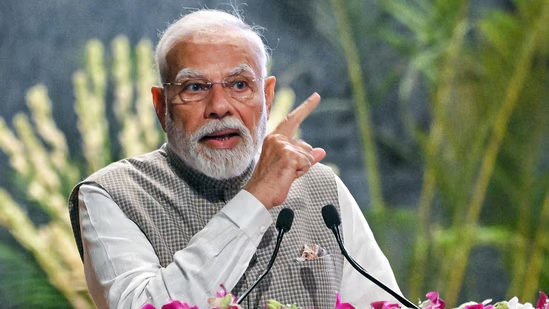
Nigeria’s Dr. Ademola A. Adenele Senior Special Adviser on Agricultural Innovation Federal Ministry of Agriculture and Food Security becomes first laureate of landmark international honour celebrating science for humanity
On a day resonant with symbolic purpose, Prime Minister Narendra Modi addressed a distinguished gathering of scientists, farmers, and thought leaders to inaugurate the M.S. Swaminathan Global Award for Food Security and Peace, describing the late agricultural visionary as “a scientist whose work was not confined to discovery, but dedicated to delivery.”
Speaking on National Handloom Day, the Prime Minister remarked that the handloom sector—a repository of artisanal skill, ecological prudence, and cultural continuity—has at last received the national recognition it richly deserves. “Much like India’s traditional weavers, our farmers too represent an unbroken civilizational thread of resilience, sustainability, and ingenuity,” he observed.
Gujarat, Ground Zero: A Personal Recollection
Recalling his long association with Prof. M.S. Swaminathan, Modi said, “Gujarat was once a parched land, ravaged by drought and desertification. When I served as Chief Minister, Prof. Swaminathan stood by us—not with platitudes but with practical science. His interventions transformed adversity into opportunity.”
He lauded Prof. Swaminathan’s belief that science must not dwell in ivory towers. “Science,” the Prime Minister quoted him, “is not about discovery alone—it is about delivery.” This ethos, he affirmed, continues to guide India’s agricultural policies.
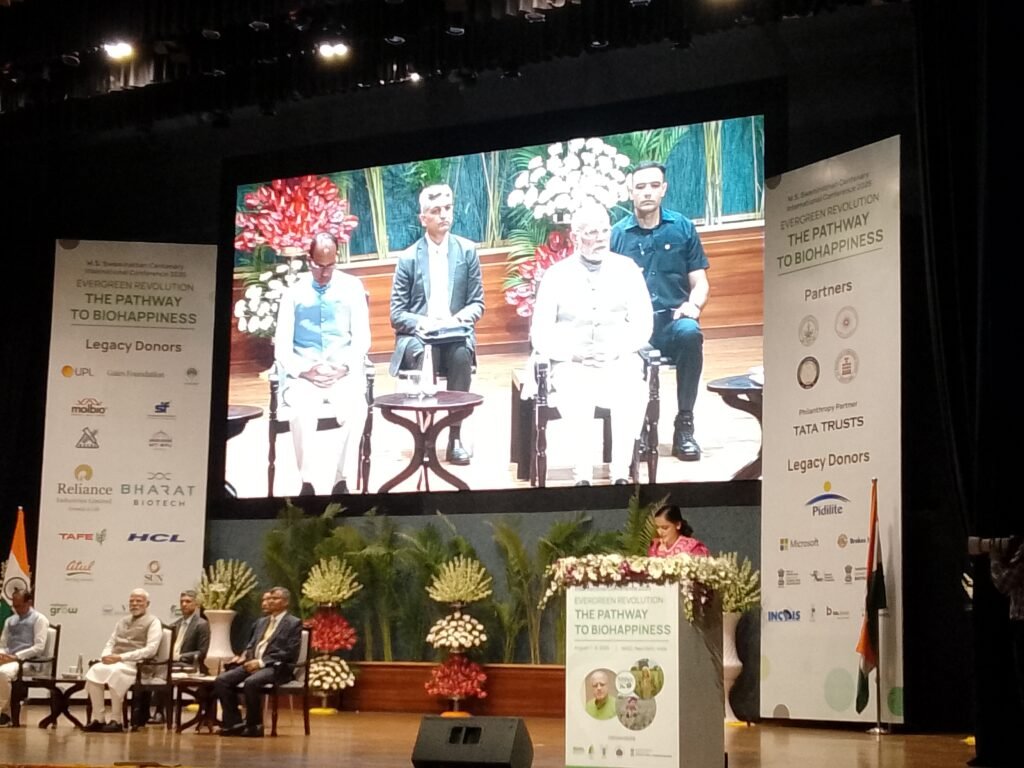
Architect of an Evergreen Revolution
Prof. Swaminathan’s contributions, the Prime Minister said, were not confined to increasing yields. He warned farmers against the perils of monoculture, the overuse of synthetic fertilizers, and the degradation of groundwater. Long before climate change became a global catchphrase, he proposed regenerative solutions grounded in local biodiversity.
Among his most transformative ideas was the Bio-Village Model, which integrated ecological sustainability with rural empowerment. He advocated for Community Seed Banks to preserve genetic wealth within farming communities and promoted Opportunity Crops, emphasising underutilised yet climate-resilient species. Perhaps most prescient was his tireless advocacy for millets—grains long dismissed as “coarse” but now hailed as Shree Anna, central to India’s nutritional and climate strategy. Swaminathan also believed that the genetic resilience of mangroves—plants that thrive in salinity and stress—could be harnessed to engineer rice varieties resilient to future climate shocks.
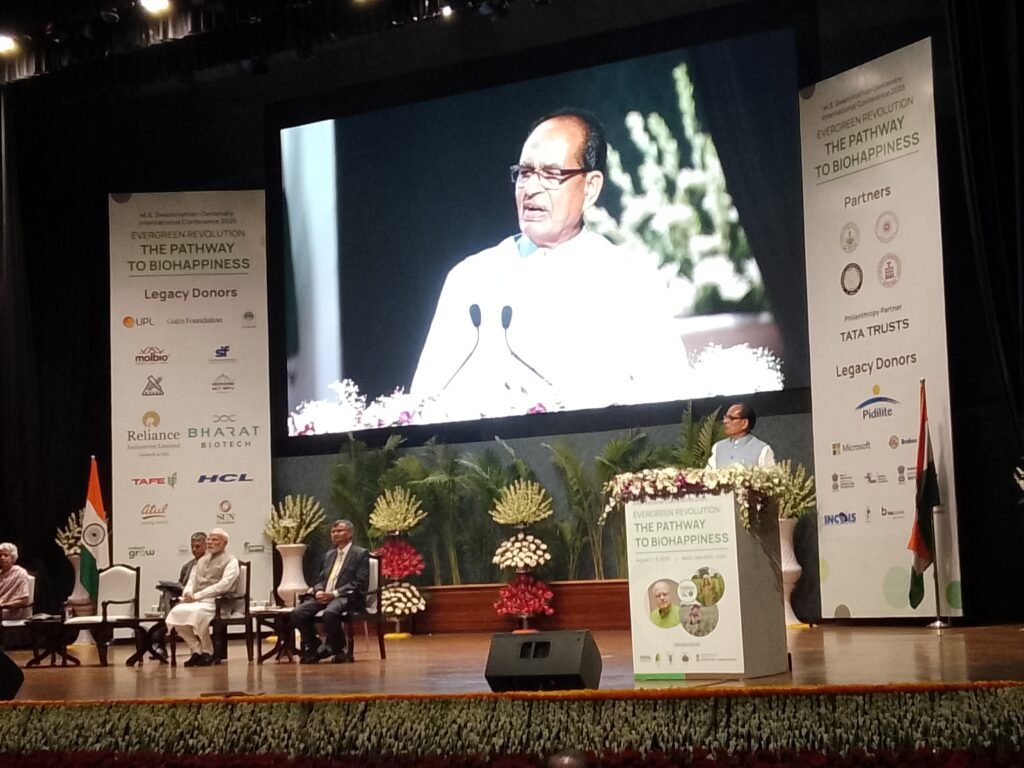
“Today, biodiversity may be the buzzword,” the Prime Minister noted, “but Prof. Swaminathan spoke of something more profound—Biohappiness—the idea that true agricultural progress lies not just in yield, but in the well-being of the farmer, the soil, and the seed. That is the soul of our Viksit Krishi Sankalp.”
A Statesman’s Tribute: Lessons from the Green Revolution
Adding a historical dimension to the proceedings, Shivraj Singh Chouhan, Minister of Agriculture & Farmers Welfare, Government of India offered a stirring tribute. “Live for the country, live for society, live for farmers—this was the credo by which Prof. M.S. Swaminathan lived,” he declared. Tracing the genesis of India’s agricultural transformation, Chouhan reminded the audience that it was the devastating Bengal Famine that sowed the seeds of resolve in Prof. Swaminathan—leading to what would eventually blossom into the Green Revolution.
“In 1966,” he recalled, “India imported 18,000 tonnes of Mexican wheat into Punjab. That single act, under Swaminathan’s scientific stewardship, triggered a productivity leap from 5 million to 17 million tonnes of wheat. It was not just the transformation of agriculture; it was the transformation of destiny.” Today, he affirmed, India is not only food secure, but self-reliant in wheat and surplus in rice—a remarkable feat of collective will and scientific ingenuity.
Chouhan called for a renewed agricultural renaissance under the banner of Viksit Krishi Sankalp, with a laser focus on increasing pulse production to achieve Zero Hunger. He emphasised that a second Harit Kranti must be launched—one that embeds environmental sustainability and social equity into every stage of technological innovation, from seed development to satellite-driven monitoring.
A Global Honour: Nigeria’s Dr. Adenele Receives First-Ever Swaminathan Award
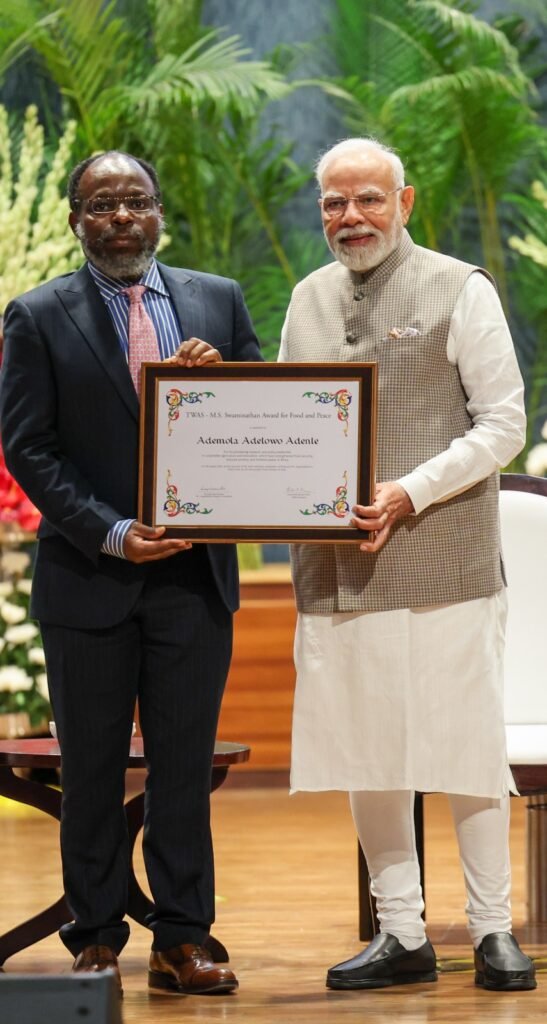
In a historic gesture that underscored Swaminathan’s global legacy, the inaugural M.S. Swaminathan Global Award for Food Security and Peace was awarded to Dr. Ademola A. Adenele of Nigeria, whose work on climate-adaptive agriculture and farmer-led seed systems has transformed livelihoods across Sub-Saharan Africa. His commitment to grassroots innovation, biodiversity conservation, and participatory science mirrors Swaminathan’s own belief in science as an instrument of human dignity.
This award is more than a medal—it is a moral compact to pursue agricultural science in service of peace, nutrition, and planetary stewardship.
Cultivating Confidence: The Fibre–Feed–Food Formula for Agricultural Progress
Prof. Adenle observed that while genetically modified organisms hold considerable promise — notably in curbing the overuse of agricultural chemicals — they are not without their share of apprehensions, ranging from biosafety and ecological ramifications to the monopolistic sway of large corporations. He underscored the imperative of engaging indigenous scientific expertise and instituting robust regulatory frameworks.
Expounding upon his “F3” paradigm — Fibre, Feed, and Food — he delineated a measured, trust-building progression in the public adoption of GM technology. The journey commences with GM cotton, destined solely for textiles and thus free of dietary entanglements, proceeds to GM animal feed vetted through exacting safety protocols, and ultimately culminates in GM food. This deliberate sequencing, he contends, engenders both farmer and consumer confidence in the benignity of GM products for human nourishment.
Prof. Adenle also drew attention to the formidable challenges confronting global agriculture — from land degradation, climate change, and entrenched poverty to dwindling water resources. Technology, he asserted, would be indispensable in addressing these crises. Yet, geopolitical turbulence — in the form of conflicts, wars, and skewed trade relations — has already disrupted supply chains, precipitating shortages, inflationary spikes, and market volatility. Citing the steep U.S. tariff increases under President Donald Trump — in some cases between 20 per cent and 50 per cent — he warned that absent coherent long-term policies, such measures can metastasise into full-blown crises, and that reflexive retaliation may not always be the wisest course.
He urged that nations focus on elevating the quality of their domestic agricultural output to reduce dependency on imports. For India, he advocated the deployment of bio-fortified crops to enhance nutritional value, noting that these need not be exclusively genetically modified — refined traditional varieties could be equally effective. With global food production projected to expand by 70 per cent by 2050 to feed an ever-growing population, he called for substantial investment in agricultural research and development. Without such commitment, he cautioned, keeping pace with innovation leaders such as China, the United States, and the European Union — whose investments in AI, genome editing, biotechnology, and GMOs are already formidable — would prove challenging. Ultimately, he maintained, policy frameworks from UN agencies and global financial institutions must be harmonised with the developmental imperatives of each nation.
From Lab to Land: Vision for a Resilient Agri-Future
Reiterating India’s commitment to its farming community, the Prime Minister outlined a holistic policy vision designed to ensure that agricultural prosperity is both inclusive and future-ready. Initiatives such as PM-KISAN Samman Nidhi, PM Fasal Bima Yojana, and PM Krishi Sinchayee Yojana have been implemented to provide direct income support, crop insurance, and expanded irrigation access, respectively. The creation of 10,000 Farmer Producer Organisations (FPOs) has aimed to empower smallholders with collective bargaining power, while e-NAM has ushered in a new era of digital market access for farmers across India.
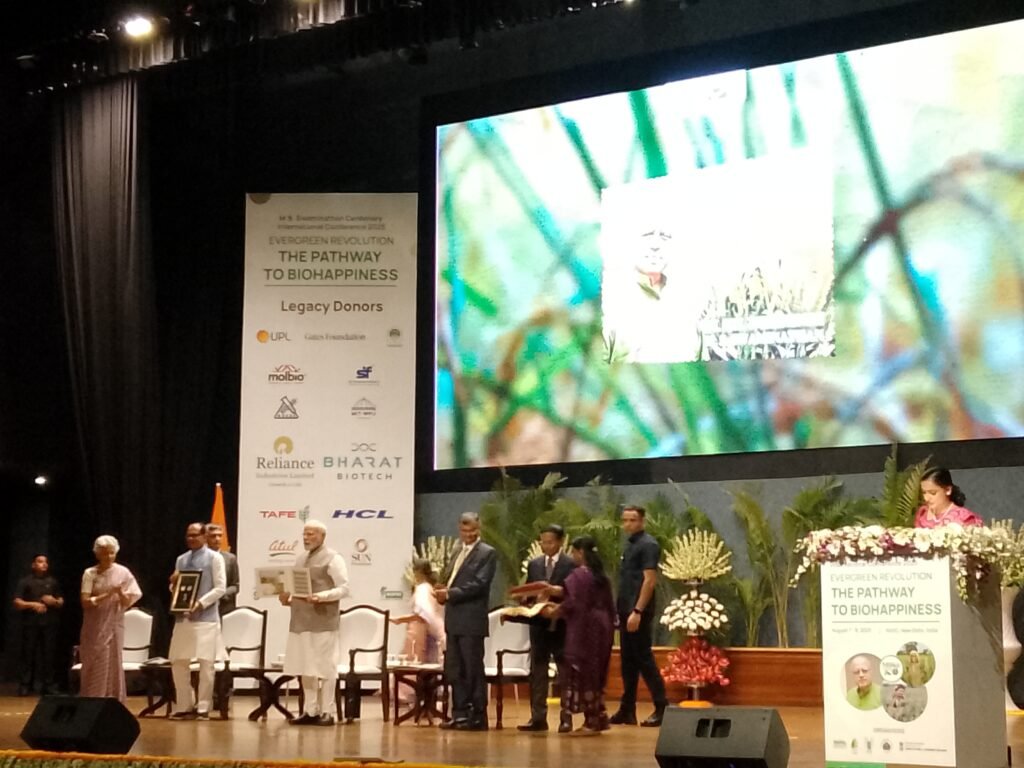
Complementing these are ambitious interventions like PM Kisan Sampada Yojana and PM Dhan-Dhanya Yojana, which strengthen agri-processing and food security infrastructure. “India has achieved food security,” the Prime Minister asserted. “But the time has come to strive for nutrition security—through the cultivation of drought-tolerant and heat-resistant crops that meet both climatic and dietary imperatives.”
He called for a nationwide push toward cost-effective soil testing tools, precision agriculture, and the seamless integration of AI, machine learning, and GIS-based crop monitoring. From the village field to the satellite dashboard, India’s agricultural systems must become smarter, faster, and more adaptive. Startups in the agritech space must be nurtured and guided, crop diversification must be institutionalised as a national priority, and the Lab to Land initiative must be more than a slogan—it must be the scaffolding of our collective agricultural renaissance.
“As farming grows, so does India,” he concluded. “This is not merely a slogan. It is a strategic imperative—and our solemn commitment to every farmer, every hectare, and every hungry mouth on this planet.”